Greek scholars in the Renaissance facts for kids

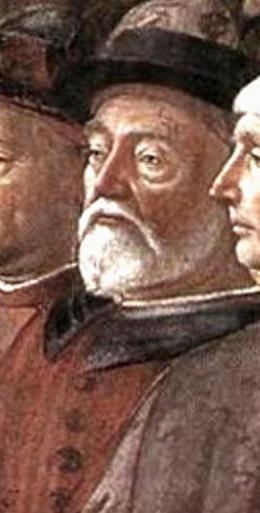
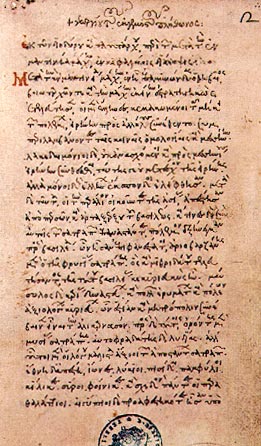
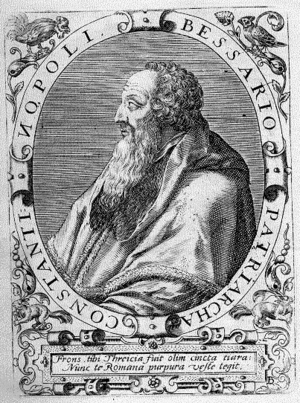
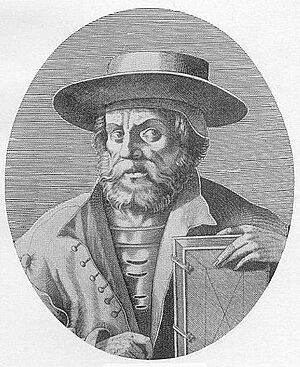
After the Byzantine Empire ended in 1453, many Greek scholars and people moved to Western Europe. This movement is seen by many as a key reason for the rebirth of Greek studies. It also helped develop Renaissance humanism and new ideas in science. These scholars brought with them ancient Greek knowledge that had been lost in the West during the Early Middle Ages. Some experts believe this move of Greeks to Italy marked the end of the Middle Ages and the start of the Renaissance.
Contents
How Greek Scholars Shaped the Renaissance
Greek scholars played a big part in Renaissance humanism by teaching the Greek language to people in the West. They taught in universities or privately. They also shared many old Greek texts. Two early translators, Barlaam of Calabria and Leonzio Pilato, were born in southern Italy and learned Greek. Their work greatly influenced the humanists.
By the year 1500, about 5,000 Greek-speaking people lived in Venice. Venice also controlled places like Crete and Dalmatia. Many refugees from other parts of the Byzantine Empire moved to these areas. They preferred Venetian rule over Ottoman rule. Crete became famous for its Cretan School of icon-painting. After 1453, this became the most important art style in the Greek world.
After the Italian Renaissance reached its peak in the early 1500s, things changed. Greek scholars in Italy began working to stop the Ottoman Empire from expanding into former Greek lands. They also tried to prevent the Protestant Reformation from spreading there. They helped bring Eastern Churches back together with Rome. In 1577, Gregory XIII started the Collegio Pontificio Greco in Rome. This college was for young Greeks from any nation that used the Greek Rite. It also welcomed Greek refugees in Italy, as well as people from Ruthenians and Malchites from Egypt and Syria.
Impact on History and Philosophy
Ideas from ancient Rome were already popular in the 1300s. But the Greek knowledge brought by Byzantine scholars changed the direction of humanism and the Renaissance itself. Greek learning affected all subjects, especially history and philosophy. History changed because old Greek historians' writings were rediscovered and shared. This knowledge helped history become a guide for living a good life. People learned from past events and people. The influence of this new Greek history can be seen in how humanists wrote about virtue. They used examples from Greek times to show good and bad behavior.
The ideas of Aristotle and Plato also greatly influenced the Renaissance. They led to discussions about humanity's place in the universe. People debated the immortality of the soul and how humans could improve themselves through virtue. The many philosophical writings in the 1400s show how much Greek philosophy and science impacted the Renaissance. These changes had a lasting effect for centuries. They influenced not only humanist writings but also education and values in Europe and Western society, even today.
Key Contributions of Greek Scholars
Deno Geanakopoulos, a scholar, summarized the contributions of Byzantine Greek scholars. He noted three main shifts in Renaissance thinking:
- In early 1300s Florence, they shifted from focusing on public speaking to deeper metaphysical philosophy. This happened by introducing and re-explaining Platonic texts.
- In Venice and Padua, they reduced the strong influence of Averroist Aristotle in science and philosophy. They added Byzantine traditions that used ancient and Byzantine writings about Aristotle.
- In the mid-1400s in Rome, they focused on creating more accurate Greek texts. These texts were important for all areas of humanism and science. They also helped with understanding the Greek Church fathers. Their influence on understanding the New Testament was also very important. Cardinal Bessarion inspired Lorenzo Valla to correct the Latin vulgate Bible using the Greek text.
Important Greek Scholars
Many Greek scholars moved to Italy and other parts of Europe. They shared their knowledge and helped shape the Renaissance. Here are some of them:
- Leo Allatius (around 1586–1669), a librarian at the Vatican Library in Rome.
- John Argyropoulos (around 1415–1487), taught at universities in Florence and Rome.
- Bessarion (1403–1472), a Catholic cardinal and a key figure.
- Manuel Chrysoloras (around 1355–1415), taught in Florence, Pavia, Rome, Venice, and Milan.
- Theodorus Gaza (around 1398–1475), was the first dean at the University of Ferrara.
- George Gemistos Plethon (around 1355/1360–1452/54), was a teacher of Bessarion.
- Constantine Lascaris (1434–1501), taught at the University of Messina.
- Janus Lascaris (around 1445–1535), a scholar in Rome.
- Maximus the Greek (around 1475–1556), studied in Italy before moving to Russia.
- Marcus Musurus (around 1470–1517), taught at the University of Padua.
- Nicholas Leonicus Thomaeus (1456–1531), taught in Venice and Padua.
Greek Artists and Musicians
Greek artists and musicians also played a role in the Renaissance. They brought their unique styles and talents to Italy and other places.
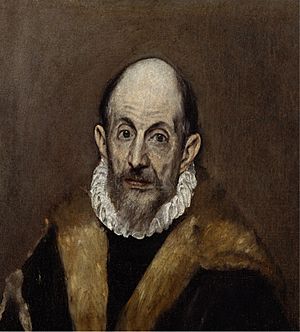
- Marco Basaiti (around 1470–1530), a painter in Venice.
- Michael Damaskenos (1530/35–1592/93), a Cretan painter who worked in Venice.
- El Greco (1541–1614), a very famous painter from Crete. His real name was Dominikos Theotokopoulos. He worked in Italy and Spain.
- Francisco Leontaritis (1518 – around 1572), a singer and composer who worked in Italy and Bavaria.
- Anna Notaras (died 1507), set up the first Greek printing press in Venice.
- Antonio Vassilacchi (1556–1629), a painter from Milos who worked in Venice with Paolo Veronese.
See also
- Byzantine art
- Cretan School
- Byzantine science
- French humanism, a movement influenced by Greek scholars in France
- Greek College
- List of Byzantine scholars
- Renaissance humanism
 | Stephanie Wilson |
 | Charles Bolden |
 | Ronald McNair |
 | Frederick D. Gregory |

